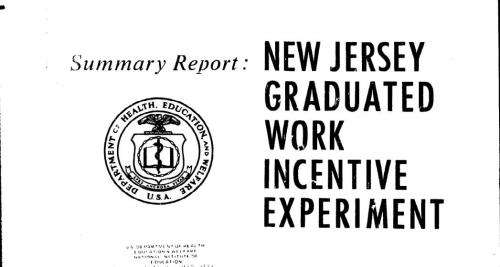Later this week, many eyes in the policy world will be on Switzerland as its voters decide whether to approve a national basic income for all citizens to replace some welfare benefits. The idea of paying all citizens a stipend to improve their standard of living also has been recently discussed in several other countries, including Canada, the Netherlands, and Finland.
The idea is not a new one. In fact, nearly 50 years ago, it helped start a revolution in social policy research.
In the late 1960s, our young company pioneered the use of a random assignment study to evaluate the effectiveness of a significant policy initiative—the New Jersey Negative Income Tax Experiment, which bore many similarities to the Swiss basic income proposal.
Tracing the Roots
The June 5 referendum in Switzerland is the world’s first national vote on a basic income proposal. The initiative, crafted by a group called Basic Income Switzerland, calls for all citizens—regardless of wealth or work status—to be guaranteed an automatic income from the government to keep everyone above the poverty line.
Proponents say the Swiss initiative would cover all citizens’ basic needs, would lead to better working conditions, and wouldn’t be costly because it would replace most existing social benefits. The Swiss government and most citizens oppose the referendum. Critics say a basic income would deter people from working and would boost taxes.
The roots of the basic income idea can be traced to the famed American economist Milton Friedman, who proposed the “negative income tax” concept to alleviate poverty in this country. (He explains it in this 1968 interview.)
Similar to the current proposal in Switzerland, under Friedman’s plan all Americans would be guaranteed a certain income from the government to maintain a minimum standard of living. The amount of that payout would be based on earned income reported to the Internal Revenue Service; the “negative income tax” refers to the rate at which benefits would be reduced as earned income rose. Proponents believed this plan would be more efficient to administer than the existing web of welfare programs, and that it would be less of a disincentive to employment because it would not penalize people for working.
Putting the Idea into Action
Friedman’s concept was put to the test in the New Jersey Negative Income Tax Experiment, also known as the New Jersey Graduated Work Incentive Experiment, which was evaluated by Mathematica in the first large-scale field experiment of a policy initiative.
The Office of Economic Opportunity, created by the Johnson Administration to administer anti-poverty programs, funded a study of 1,300 low-income families in urban communities in New Jersey and Pennsylvania. The study was divided into a treatment group that, over three years, received government payments based on family income, and a control group that did not receive the same benefit over that period.
A report on the experiment found that the negative income tax provided support to low-income citizens without deterring them from working, giving proponents hope for the program. Other experiments followed through the 1970s in Gary, Indiana; Seattle; and Denver.
The larger Seattle and Denver study revealed that the negative income tax was much more of a disincentive for people to work than the initial New Jersey study showed. This finding led then-Sen. Daniel Patrick Moynihan, a longtime champion of the negative income tax, to question the initiative’s effectiveness—sounding its death knell in the United States.
The Impact on Evaluation
Although the negative income tax experiment ultimately failed as a policy initiative, it helped change the face of program evaluation forever by demonstrating the feasibility of field testing program initiatives using a random assignment design.
Like Senator Moynihan before them, policymakers today must rely on research as they grapple with pressing questions that impact the lives of people across the globe. Since the 1970s, experimental studies conducted by Mathematica and our peers in the research world have exploded in scope to encompass a wide range of social policy areas, including labor, health, education, family support, nutrition, disability, early childhood, and international development. And policymakers are more aware of the need for evidence to inform their decisions. Recently, U.S. lawmakers approved the bipartisan Evidence-Based Policy Commission Act, which aims to broaden the use of evidence and data in federal policymaking. This was a critical development, as more than 99 percent of federal government spending still occurs without evidence behind it, despite the significant progress in making evidence available to policymakers.
As Swiss voters head to the polls to decide on the newest generation of the negative income tax, the history of this idea reminds us of how far the field of policy research has come in the past half-century—and why evidence-based decision making is so vital in our world today.



